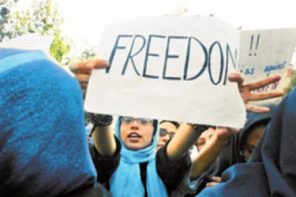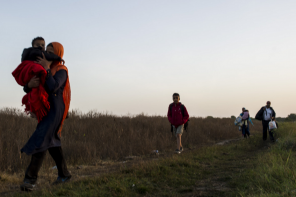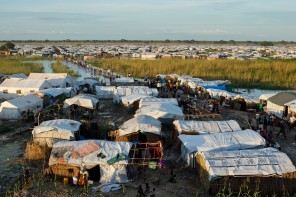The Globe & Mail has an article today about abuses by Libyan rebels (h/t @geoffreyyork). I think it’s a good piece, and if you’ll indulge me a second, I’ll point out that I find the reporter Graeme Smith very deft here:
For the most part, rebels appear to have kept their prisoners safe, giving them enough food, water, and medical care. The Globe and Mail visited rebel jails in Benghazi, Misrata and Tripoli, finding relatively few complaints about abuse and mistreatment in custody.
But tension prevailed in the rooms full of men, ordered to sit in tight rows, at the small wooden school desks previously occupied by young children at Victory School in Tripoli. Men with Kalashnikov rifles yelled at them: “Where is Gadhafi?” Outside, guards argued with each other and sprayed bullets at random in a tussle for control of an automatic weapon.
Some prisoners seem reluctant to speak about their experiences; one man gestured at a wound on the top of his head, and explained: “I fell while walking.”
A scene-based, detailed, humanistic portrait of distrust and danger, whose secondary meaning is also, “Lots of these guys are lying to us.” It’s a really smart way of recognizing a journalist’s limitations in a situation when sources have so many reasons for telling a story the way they do — and so many choices in that telling.
But there’s also something unusual here: A headline for the status quo. The old joke about journalism is that we don’t write it up when a dog bites a man, but if a man bites a dog, that’s front page news.
Rebel atrocities are the norm in conflicts. So why does this merit a headline?
I’d like to believe the idea that it merits a headline because it’s important, and all atrocities everywhere should be recognized and witnessed. But even I have learned such a naive argument is not going to get a story in the paper, and I’m very sappy and wishy and still pretty new at all this.
Which is to say, this article got me thinking about the way policymakers anticipate, or don’t, their good guys becoming bad guys. For me, this (indeed useful) article foreshadows a coming conversations.
I’d bet there’s going to be a reflexive tendency by US authorities to respond (if they do at all) to this in two ways — to deny or minimize the rebel abuses, because we backed them, or to eschew humanitarian intervention later because these guys committed abuses and embarrassed us. We perfected the first strategy in Latin America in the 1980s; I’m not sure how powerful the second response will actually be when resources we want are at stake, but I’d bet it gains some rhetorical power, at least.
I don’t think either approach is useful. The first approach I find so objectionable that I can’t imagine it meriting a discussion. It’s the second one that concerns me: Can we find a way, both in our political discourse and in our policy-making, to weigh the likelihood that the guys we back will commit war crimes or other abuses without foreclosing the conversation? If we can, can we do the next thing we need to do: put resources and political will behind the idea that those abuses shouldn’t occur? Can we build a policy that normatively rejects atrocities even as it recognizes, pragmatically, that these abuses may happen, and works out the consequences of a reality we all wish weren’t, and agree shouldn’t be, the case?
I raise this question because my hunch is that rebel abuses in Libya will become the shorthand for anti-intervention arguments in the future. My optimism about the future of R2P-style intervention died in Libya long before this, but I do think this could be a consequence.
I’m not making claims about knowing the Libyan situation particularly well; I’m a close reader of news, but that’s it, and we all have a thousand reasons to doubt the variations on fact and frame that are presented to us in that space every day. But I think there’s a big question here about transitional moments. Bluntly, but earnestly, it’s this: What did we really think was going to happen in the meantime? And what plans did we make?
Geoffrey York, the Globe & Mail’s Africa correspondent, responded to my 280-character version of the first question by reminding, “The expectation of atrocities doesn’t mean we should be silent when they happen. Can’t use the ‘it’s war’ excuse.” No question, he’s absolutely right. But it’s something else that troubles me. Many of us know and agree on what should and shouldn’t happen, and I think anyone reading this blog probably agrees with York that we shouldn’t be silent when those norms are violated. But what should we do — and what can we do — when what shouldn’t happen does happen? There’s all kinds of necessary and important post-hoc accountability mechanisms, yes. But what happens before that?
I’m not advocating leniency here. What I am saying, though, is that I’m worried about a conversation on intervention that presumes, as the reflex on Libyan rebel crimes suggests we may presume here, that our chosen guys are also the good guys and then acts surprised when they aren’t. That would make a nice movie, but it’s a lot more work to have a responsible conversation, and build an ethical policy, that plans for the fact that the good guys/bad guys binaries of our myths don’t apply to the real world.





Don’t know if you’ve previously posted on this, but a lot of the worst rebel atrocities seem to be against black Africans. See Alex Engwete, for example: http://alexengwete.afrikblog.com/archives/2011/08/26/21867075.html
Yes, this article (and several others of late) have mentioned this, too — usually saying that anyone dark-skinned is suspected of being a Gadhafi mercenary. It’s definitely a tragic mess.
Nicely done Jina. You could take most of what you wrote here and equally apply it to Cote d’Ivorie.
Good point. that reminds me, I need to blog about the foreign affairs article on CdI. Did you read it? It was fantastic.